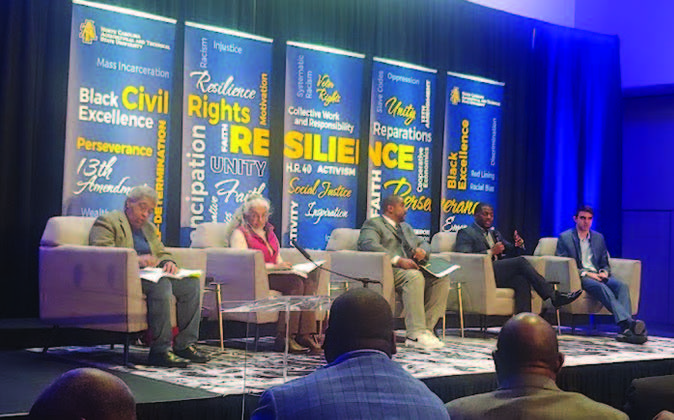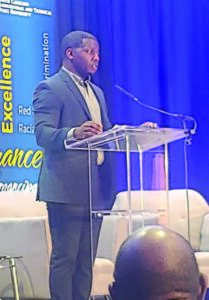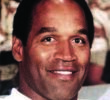N.C.A&TSU hosts an equity in higher education panel
By Yasmine Regester, Peacemaker Staff Writer / March 24, 2023
Panel – (L-R) William A. Darity Jr., Ph.D., A. Kirsten Mullen, authors of “From Here to Equality: Reparations for Black Americans in the Twenty-First Century; Jelani Favors, Ph.D., A&T’s Henry E. Frye Endowed Professor; Adam Harris, The Atlantic journalist and author; and Hank Tucker, staff writer and member of Forbes’ money and investing team. Photos by Yasmine Regester/Carolina Peacemaker.
“These Black institutions of education were founded out of necessity,” said Adam Harris, journalist and author during North Carolina A&T State University’s speaker series last week.
Harris spoke at North Carolina A&T State University’s Alumni Foundation Event Center on March 15 in a program titled “An Audacious Call to Action: HBCU Equity in Higher Education” His book covers the inequity Black students, HBCUs and African Americans overall have faced in higher education.

Guest speaker, Adam Harris, journalist and author of “The State Must Provide: Why America’s Colleges Have Always Been Unequal – And How To Set Them Right.” Photo by Yasmine Regester/Carolina Peacemaker.
Harris’ book explores the history of inequality that has long plagued Black students, historically Black colleges, and universities (HBCUs) and African Americans in higher education overall.
According to Harris, America’s colleges and universities have a shameful secret: they have never given Black students a fair chance to succeed. The idea that Black students have always been an afterthought when it comes to higher education is a topic that is thoroughly addressed throughout the book.
Harris’s presentation focused on the historical overview of land-grant in situations, federal funding and the often separate and unequal education facilities provided to Black students, as he details in his book.
The Morrill Act of 1862 first established land-grant colleges, but those schools often excluded people of color. It was The Second Morrill Act of 1890, that required states to establish separate land-grant institutions for Black students or demonstrate that admission to the 1862 land-grant was not restricted by race.
The 1890 act granted money, instead of land, and resulted in the designation of a set of Historically Black Colleges and Universities (HBCUs) as land-grant universities to begin receiving federal funds to support teaching, research and extensions intended to empower underserved communities. There are currently 18 affiliated universities in the 1890 System, including N.C. A&T State University.
“The importance of these institutions isn’t just to the students that attend them, but also the communities that surround them,” said Harris. “The state has provided time and time again for White students, now it must do the same for those it tried to hold back.”
The main program was followed by a panel discussion featuring Harris, William A. Darity Jr., Ph.D., and A. Kirsten Mullen, authors of “From Here to Equality: Reparations for Black Americans in the Twenty-First Century; and Hank Tucker, staff writer and member of Forbes’ money and investing team, who has published articles about the lack of HBCU funding. The forum was moderated by Jelani Favors, Ph.D., A&T’s Henry E. Frye Endowed Professor and author of the national award-winning book, “Shelter in a Time of Storm: How Black Colleges Fostered Generations of Leadership and Activism.”
Darity noted that the topic of reparations must be addressed, particularly in the way Black Americans have been historically deprived of an education.
“We don’t have the sense that slavery was so very long ago. We also don’t think that the case for reparations, for Black Americans whose ancestors were enslaved in the U.S. is a case that is supposed to be made exclusively on the basis of slavery. We would argue that the types of practices and policies after slavery ended are far more decisive in shaping the case for reparations. Particularly the way that education has been conducted in the United States to deprive Black Americans of a quality education,” he said.
Mullins added that Black Americans are owed nearly 14 trillion dollars for reparations.
“Unless White people want reparations to happen, it will not happen,” said Mullins.
Tucker’s research of HBCUs from data collected between 1987 (the earliest year for which comprehensive data are available) and 2020, showed that 18 HBCUs were underfunded by a combined total of $12.8 billion. N.C. A&T, established in 1891, was found to be the worst off; since 1987, it has been underfunded by an inflation-adjusted total of $2.8 billion.
“The numbers don’t lie. It’s clear there is inequity here,” said Tucker, who pointed out the fact that although enrollment is tied to funding, funding levels have not increased with enrollment.
N.C. A&T Chancellor Harold Martin noted that from the beginning, Black folks have been given less and expected to do more.
“It’s critical to know the magnitude of these issues to advocate for solutions. It’s good to understand that inequity isn’t just part of our history as HBCUs. We should not sugarcoat it by any measure. Lack of inequity has impeded progress, holding our campuses back in many ways, which that have only recently been remedied through some examination of policy and provisions that have allowed us to see some sense of understanding of the deficit that still exists today.”







